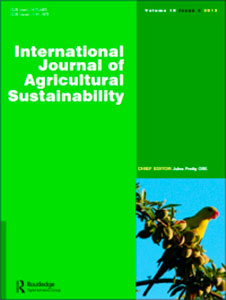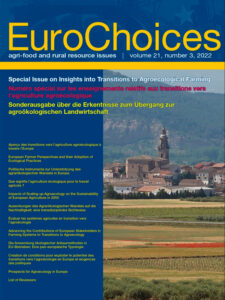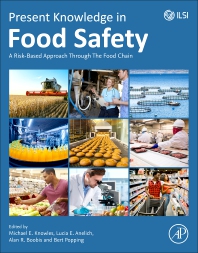Factors influencing business model change: a case study for the European crop protection industry
This paper proposes a theoretical framework for the comprehensive study of business model (BM) change by taking different types of influencing factors and different levels of analysis into account (business, industry and macro-environment).
Authors: Liselot Bourgeois, Jef Van Meensel, Fleur Marchand and Steven Van Passel.
Evaluation of the added value of using the combination of three existing frameworks (the business model canvas (Osterwalder and Pigneur, 2010), Porter’s five forces framework (Porter, 1980) and PESTEL (Johnson et al., 2017)) based on semi-structured interviews with eight companies active in the European crop protection industry. The proposed theoretical framework was used to analyse several BM change situations as presented by the companies. Our findings reveal that the study of BM change is improved when a third type of influencing factors is considered besides drivers and facilitating/hindering factors. This third type includes factors that shape cohesion between BM components or between the BM and its environment. Second, the interaction of different types of influencing factors at different levels of analysis should be considered, as this generates a comprehensive view of the BM change situation.
Combining life-cycle assessment and linear programming to optimize social fertilizer costs
This paper focuses on the role of fertilizers within regional nutrient cycles. Bio-based fertilizers can contribute to regional nutrient circularity, but the question remains whether production and consumption of bio-based fertilizers is beneficial to the farmer and the environment.
Authors: Erika De Keyser, Timothy Rowe, Lorenzo Giacomella, Dominik Jasiński, Erik Mathijs and Liesbet Vranken.
Therefore, both farmers’ private costs and environmental externalities should be taken into account. We formulate a farm-level multi-objective optimization model by considering a range of fertilizers, their costs and the environmental consequences associated with their production and use. The cost-minimization approach is applied to a conceptualized Flemish leek farmer aiming to safeguard nutrient uptake while being constrained by nutrient standards and the availability of on-farm residues. Our results suggest that mineral fertilizers have an important role in the fertilizer mix despite their environmental externalities. Nevertheless, there is also a role for bio-based fertilizers. These results have implications for farmers and policymakers wishing to internalize fertilizer externalities.
Sustainability transitions in agri-food systems through the lens of agent-based modeling: a systematic review
Agri-food systems (AFS) and their value chains are currently under pressure to minimize environmental degradation and secure a more sustainable future. Sustainability transitions are needed to shift from well-established, yet vulnerable systems to more sustainable systems.
Authors: Alba Alonso-Adame, Jef Van Meensel, Fleur Marchand, Steven Van Passel and Siavash Farahbakhsh.
Agent-based modeling (ABM) as a method to study complex systems is now widely used in transition modeling. We performed a systematic review to analyze the potential of ABM to yield insights into sustainability transitions in AFS. Specifically, we investigated the understanding that agent-based models can support better understanding of sustainability transitions in AFS. We identified potential in participatory modeling methods as well as combining agent-based models with complementary methods. The assessment of the sustainability dimensions was quite balanced between economic and environmental dimensions, but the social dimension was underrepresented. Here, we identify the main features to further advance ABM of sustainability transitions in AFS.
An optimization model minimizing costs of fertilizer application in Flemish horticulture
The majority of today’s fertilizers are based on mineral resources and fossil fuels. Among other factors, geopolitical sensitivities and rising fertilizer demand contribute to high and volatile prices. To reduce our dependency on nonrenewable resources, valuable bio-based fertilizer components can be recovered through valorization of organic waste streams.
Authors: Erika De Keyser, Anke De Dobbelaere, Jan Leenknegt, Erik Meers, Erik Mathijs and
Liesbet Vranken.
However, from a farmer’s perspective, an optimization problem arises: the farmer wants to minimize costs while safeguarding crop nutrient uptake. Optimization research in the fertilizer domain focuses on scheduling fertilizer application or minimizing manure management costs. The model developed in this paper intends to minimize fertilizer costs for an individual vegetable farmer by considering the possibility of bio-based fertilizer prosumption through composting and anaerobic digestion as well as leaving crop residues on the field. In a Linear Programming model, these options are compared to purchasing mineral fertilizer, commercial compost or pig slurry. In addition, a distinction is made between different business models. Sensitivity analysis is carried out with respect to changing cost parameters. The results confirm that it is not optimal for a Flemish vegetable farmer to fulfil nutrient needs solely with bio-based fertilizer. Nevertheless, the study shows that it can be interesting to consider value chains involving regional cooperation.
Impacts of the Ukraine–Russia Conflict on the Global Food Supply Chain and Building Future Resilience
The reverberations of the Ukraine–Russia conflict have been keenly felt in 2022 as the impacts of Russia’s invasion of Ukraine quickly cascaded across the globe, significantly exacerbating existing pressures on global systems
Authors: Ellen Dyson, Rachel Helbig, Tessa Avermaete, Kate Halliwell, Philip C. Calder, Lynn R. Brown, John Ingram, Bert Popping, Hans Verhagen, Alan R. Boobis, Isabelle Guelinckx, Louise Dye and Neil Boyle.
The vulnerabilities of the global food system have been particularly laid bare with significant disruptions to food and fertiliser supply chains instigating profound shocks on global food supply – disproportionately affecting poorer and vulnerable populations of the Global South. The immediate concerns and potential solutions to the global impacts of the Ukraine–Russia conflict were recently discussed by a panel of industry, academic and civil society experts convened by the European branch of the International Life Sciences Institute, all of whom are authors of this manuscript. The key concerns: the reduced affordability of food – focussing on those most vulnerable to its effects; the socio-political implications of reduced food security; food safety; and nutrition security are all discussed in this Point de Vue. The authors voice the need for improved resilience to future shocks and stress on the food system.
A typology of sustainable circular business models with applications in the bioeconomy
As an approach to sustainable development, circular business models are increasingly being developed
Authors: Erika De Keyser and Erik Mathijs.
Division of Bioeconomics, Department of Earth and Environmental Sciences, KU Leuven, Leuven, Belgium
However, many circular business models focus on environmental or technological contributions to sustainability rather than considering all dimensions of sustainability simultaneously. Based on existing sustainable business model archetypes, a hierarchical business model typology is developed that allows a stepwise exploration of sustainable business model innovation opportunities incorporating an environmental, social and economic dimension. An analysis of business model components generates a closer look on the six newly defined Sustainable Circular Business Models. Finally, a conceptual application for organic waste valorization technologies, supported by examples from literature, allows a practical view on the implementation of the business models in the bio-economy. The typology offers a guide toward sustainable business model design or innovation opportunities centered around technologies creating value from waste.
Present Knowledge in Food Safety
A Risk-Based Approach Through the Food Chain
Chapter 71 on “Food and nutrition security: challenges for farming, procurement, and consumption” is written by Tessa Avermaete, Wannes Keulemans, Olivier Honnay, Gerard Govers, Barbara De Coninck and Tjitske Anna Zwart. They are members of KU Leuven Team (Project Coordinator).
Present Knowledge in Food Safety: A Risk-Based Approach Through the Food Chain presents approaches for exposure-led risk assessment and the management of changes in the chemical, pathogenic microbiological and physical (radioactivity) contamination of ’food’ at all key stages of production, from farm to consumption. This single volume resource introduces scientific advances at all stages of the production to improve reliability, predictability and relevance of food safety assessments for the protection of public health. This book is aimed at a diverse audience, including graduate and post-graduate students in food science, toxicology, microbiology, medicine, public health, and related fields. The book’s reach also includes government agencies, industrial scientists, and policymakers involved in food risk analysis.








